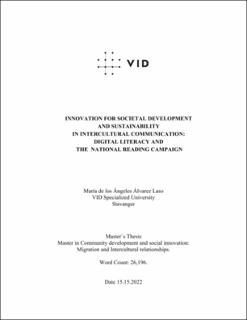| dc.description.abstract | This study attempts to describe the history of how the Norwegian language policy in the Nordic Council and The European Global Language Policy at the European Commission are implemented in The National Library Strategy 2020-2023 in Norway and its relevance across Intercultural Communication. Innovation for a democratic Language Technology infrastructure aims to participate in quality education for Literacy, prioritizing Universal Design Development on children's inclusion for social development and a sustainable future. The Research field based on Hermeneutics, Epistemology, Ethics and methodology, are a main foundation for Universal design. (Areskoug, Josefsson, Haarr, K. H., Eriksen, S. S., & Brossard Børhaug, F. 2022) Norway holds the chairmanship of the Nordic Council of Ministers in 20221 and also the chairmanship of the Network for Nordic Language Committees.2 In this connection, the focus on challenges concerning minority children inclusion in schools, libraries, and intercultural language centers, and how the development and use of language technology can contribute to supporting the Nordic countries' language policies and digital plans is a priority. (Regjeringen; sprakteknologi og de nordiske sprakene, 2022) The National Library, through the Council of language in Norway, has initiated a discussion based on the debate between digital transition and languages policies: “In today's language technology landscape, school children and teachers experience that software and writing support offered by the major international technology giants in the school does not reflect the official spelling of the local languages. Today, it is impossible to include adopted spelling standards in internationally advanced writing tools. The language norms conveyed by the big technology giants thus appear as competitors to the official spelling. The companies also do not allow locally developed language technology for small languages (e.g., Greenlandic, Sami, Norwegian, Nynorsk) to be offered as a local adaptation to the children and young people who receive their education in these languages". (Wetås. Å, Språkrådet 4.04.2022). | en_US |

